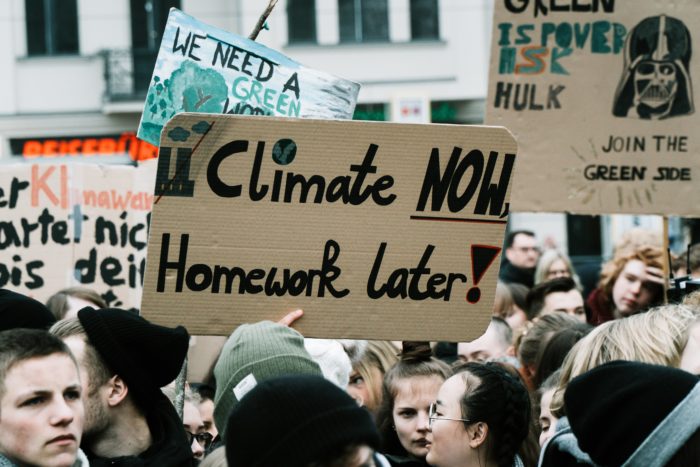Politics & Society
Shared Values No More?
Climate Change and the Transatlantic Relationship
Pundits have wrung their hands about the deterioration of the transatlantic alliance, as U.S. President Donald Trump has slapped tariffs on steel and aluminum and attacked the Federal Republic for its limited defense spending. However, the alliance may be careening toward another – and likely much larger – challenge: competing approaches to climate change. Both Germany and the United States are currently among the world’s top greenhouse gas producers. However, as German voters become more engaged on climate issues, this may change.
Berlin
Germany’s longtime Chancellor (and former environment minister), Angela Merkel, has been dubbed the “climate chancellor,” but her track record – and Germany’s progress in its energy transition – has been mixed. On Friday, Merkel’s coalition government announced a new 54-billion-euro climate policy that introduced a variety of measures from increased gas prices to more charging stations for electric vehicles. The agreement also promised that the government would not take on any new debt to fund the program, staying true to Germany’s longstanding (and much debated) “black zero” approach to its budget. Germany is not on track to reach emissions reduction goals set by the Paris Climate Agreement for 2020, and critics argue that the new measures – especially given the limited spending – will not be enough to catch up to the 2030 targets.
Germany is not on track to reach emissions reduction goals set by the Paris Climate Agreement for 2020, and critics argue that the new measures – especially given the limited spending – will not be enough to catch up to the 2030 targets.
However, policymakers in Berlin may be out of step with their voters. A recent survey from ARD found that 63 percent of Germans thought climate protection should take priority over economic growth. This held true even beyond the Green Party. The majority of Germans from across all parties (with the notable exception of the far-right Alternative for Germany) believe that climate protection should be prioritized.

Washington
Although the majority (66 percent) of Americans believe that climate change is caused by humans, it remains a partisan issue in the United States. Eighty-nine percent of Democrats blame humans for climate change, but only 34 percent of Republicans do the same.
Even some Americans who do believe that climate change is man-made would prefer their leaders prioritize the economy over environmental protection. A Washington Post and Kaiser Family Foundation survey found that 61 percent of Americans worry that taxes and regulations meant to address climate change, “will cause financial stress for ordinary Americans” and 51 percent worry that such measures could harm the economy.
Eighty-nine percent of Democrats blame humans for climate change, but only 34 percent of Republicans do the same.
President Trump’s decision to withdraw the United States from the Paris Climate agreement in 2017 was met with criticism and outrage from his counterparts in Europe, but at home his policies aligned with the beliefs of many voters.
Fridays for Future
The Fridays for Future movement, led by Swedish climate activist Greta Thunberg, has activated young people around the world, but especially in Germany. Almost a quarter (24 percent) of 14- to 24-year-olds in Germany report having participated in the movement, with thousands of young people marching out of their classrooms each week.
Although some of the protesters are too young to vote, many are not, and younger voters have been flocking to the Green Party in recent years. Twenty-nine percent of voters under 30 cast their ballots for the Greens in the recent European Parliament elections, more than double the youth votes that any other party received. This is partly due to frustration in the traditional establishment parties, but also largely connected to the party’s climate platform.
American teens were only slightly more likely (64 percent) than adults (61 percent) to report that climate change was an important issue to them.
Some young people in the United States have participated in the school walk-out movement, but fewer young Americans are engaged on climate issues. American teens were only slightly more likely (64 percent) than adults (61 percent) to report that climate change was an important issue to them.
These divisions will be further exacerbated with time, as these young people vote in bigger numbers and influence the leaders they put in office. Many Americans will almost certainly continue to elect politicians who prioritize the economy over the environment. Although Germany’s current coalition government has not made the sweeping changes that many Germans hope for, signs – from polling data to the thousands of young people marching in the streets – point to a likely shift in power in the next federal election, which might change the status quo.
Real Repercussions
Since World War II, the German-American relationship has been held together by shared values, from democracy to rule of law. In the years to come, the value of environmental protection may drive a wedge between the two nations.
The impact of climate change is only starting to be felt, and will in all probability get worse in the coming years. Although Germany and the United States will both be affected, the impact of climate change will exacerbate existing and ignite new humanitarian crises around the world. Millions could be displaced, forced to seek refuge in safer lands – likely in North America and Europe.
If the United States remains disproportionately responsible for the climate crisis and continues to prioritize economics over the environment, addressing the challenges of massive displacement and dwindling resources will be a new test to the transatlantic relationship. The shared values that have long bound the two countries together may be overshadowed by these new challenges, which threaten redefine the relationship in the 21st century.